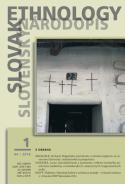Zneviditeľnenie a zjemnenie: reflexie verejného používania maďarčiny u bratislavských viacjazyčných trojgeneračných rodín
Getting Invisible and Refined: Reflections on the Public Use of Hungarian in Multilingual Three-Generation Families in Bratislava
Author(s): Lucia SatinskáSubject(s): Language studies, Finno-Ugrian studies, Western Slavic Languages, Theory of Communication, Ethnic Minorities Studies
Published by: Ústav etnológie a sociálnej antropológie Slovenskej akadémie vied
Keywords: language biography; Bratislava; multilingualism; Hungarian; language legislation; communication; communication strategy;
Summary/Abstract: On the basis of language biographies of multilingual three-generation families in Bratislava, the paper explores the communication strategies on the use of Hungarian in public. The research was conducted in the form of narrative interviews with members of five families. A total of 23 interviews were conducted. The use of a language in public is complementary influenced by language legislation, the social and political situation and individual experience. The obtained material is analysed at two levels: at the level of experience (reality of the subject) and narration (reality of the text). At the level of experience, the following strategies of avoiding conflicts have arisen from the described situations: 1) silence; 2) muting of the voice; 3) switching into Slovak; 4) switching into a “neutral” language (German); 5) responding in Slovak; and 6) preparation of children for negative attitudes. At the level of narration, the negative experience is refined using the following tools: 1) degrading the legitimacy of the attacker; 2) highlighting the “good deeds” of the members of the majority; 3) lapse of time; and 4) declared forgetting.
Journal: Slovenský národopis
- Issue Year: 64/2016
- Issue No: 1
- Page Range: 32-46
- Page Count: 15
- Language: Slovak

